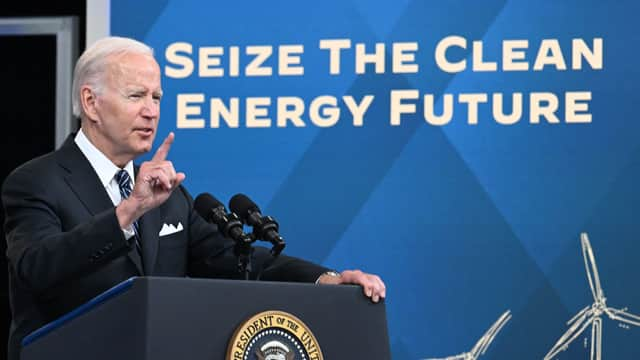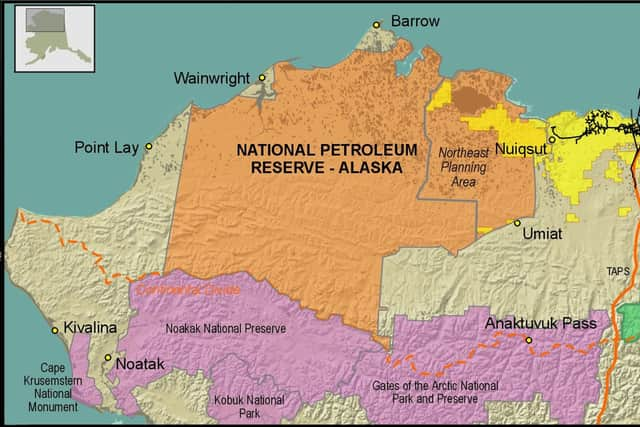Willow oil project: has Alaska oil plan been approved, ConocoPhillips project explained - petition to stop it


The Biden administration is approving the major Willow oil project on the US state of Alaska’s petroleum-rich North Slope, sources have claimed.
Environmentalists have previously voiced vehement opposition to ConocoPhillips Alaska’s ‘Willow’ project, one of the largest oil and gas developments on US federal land.
Advertisement
Hide AdAdvertisement
Hide AdCritics say an approval would conflict with President Biden’s ambitious climate goals, while supporters claim the project would offer an "economic lifeline" to the state of Alaska.
With a decision on the project expected in the near future, here is everything you need to know about it.
What is the Willow project?
The Willow project would use drilling to access petroleum stored on the Alaskan North Slope. It is predicted that doing so could produce up to 180,000 barrels of oil per day, or roughly 1.5% of the US’s current daily oil output.
It would be located within Alaska’s National Petroleum Reserve, the largest area of undeveloped public land in the country, and would be the largest US oil field in many years.
Advertisement
Hide AdAdvertisement
Hide AdConocoPhillips Alaska, the company behind the project, has suggested five drilling locations in total. ConocoPhillips Alaska is the largest producer of oil and gas in the state, with around 1,000 employees.
What are the potential ecological impacts?


Willow was initially approved by the Trump administration, but a federal judge overturned the approval after finding that the environmental review into the project was flawed.
Environmental organisations and the Native villages in the areas most impacted by the project have spoken out against it, believing it would mean the end of a way of life for communities in the rapidly warming Arctic, which is already warming nearly four times as quickly as the rest of the world..
Additionally, it would worsen air pollution issues in an area where oil and gas extraction projects already contribute to higher than average rates of asthma and other conditions. Many petitions against the project have sprung up online, including this one on Change.org, with some gathering millions of signatures.
Advertisement
Hide AdAdvertisement
Hide AdThere is broad political support for the project in Alaska, including from elected officials and the state’s governor, Republican Mike Dunleavy. The project’s backers claim local communities would profit from the taxes it would raise, which could be used to improve the region’s infrastructure and public services.
Being one of the few states without a statewide income or sales tax, the state of Alaska relies heavily on income from land leasing for energy development and taxes on the profits from extracted resources like oil and gas.
Has it been approved?
The Biden administration is approving the major Willow oil project on the US state of Alaska’s petroleum-rich North Slope, sources have claimed.
The approval – one of President Joe Biden’s most consequential climate decisions – is likely to draw condemnation from environmentalists who say it flies in the face of the Democratic president’s climate pledges. Climate activists have been outraged that Biden appears open to greenlighting the project.
Advertisement
Hide AdAdvertisement
Hide AdAllowing oil company ConocoPhillips to move forward with the drilling plan also would break Biden’s campaign promise to stop new oil drilling on public lands, they say. Activists have promoted a #StopWillow campaign on social media, seeking to remind Mr Biden of his pledges to reduce planet-warming greenhouse gas emissions and promote clean energy.
Earlier this year, a scaled-down version of the project ConocoPhillips initially proposed was recommended in an environmental assessment published by the interior department, the US government department responsible for the management and conservation of most federal lands and natural resources.
According to the Bureau of Land Management’s report, a scaled-back Willow project would have less of an adverse effect on threatened species like polar bears and caribou, while still meeting the minimum drilling requirements set by ConocoPhillips for the project to be profitable.
However, the interior department did not rule out further project reduction recommendations or an outright rejection. The decision is likely to ultimately rest with the Biden administration.
Comment Guidelines
National World encourages reader discussion on our stories. User feedback, insights and back-and-forth exchanges add a rich layer of context to reporting. Please review our Community Guidelines before commenting.
